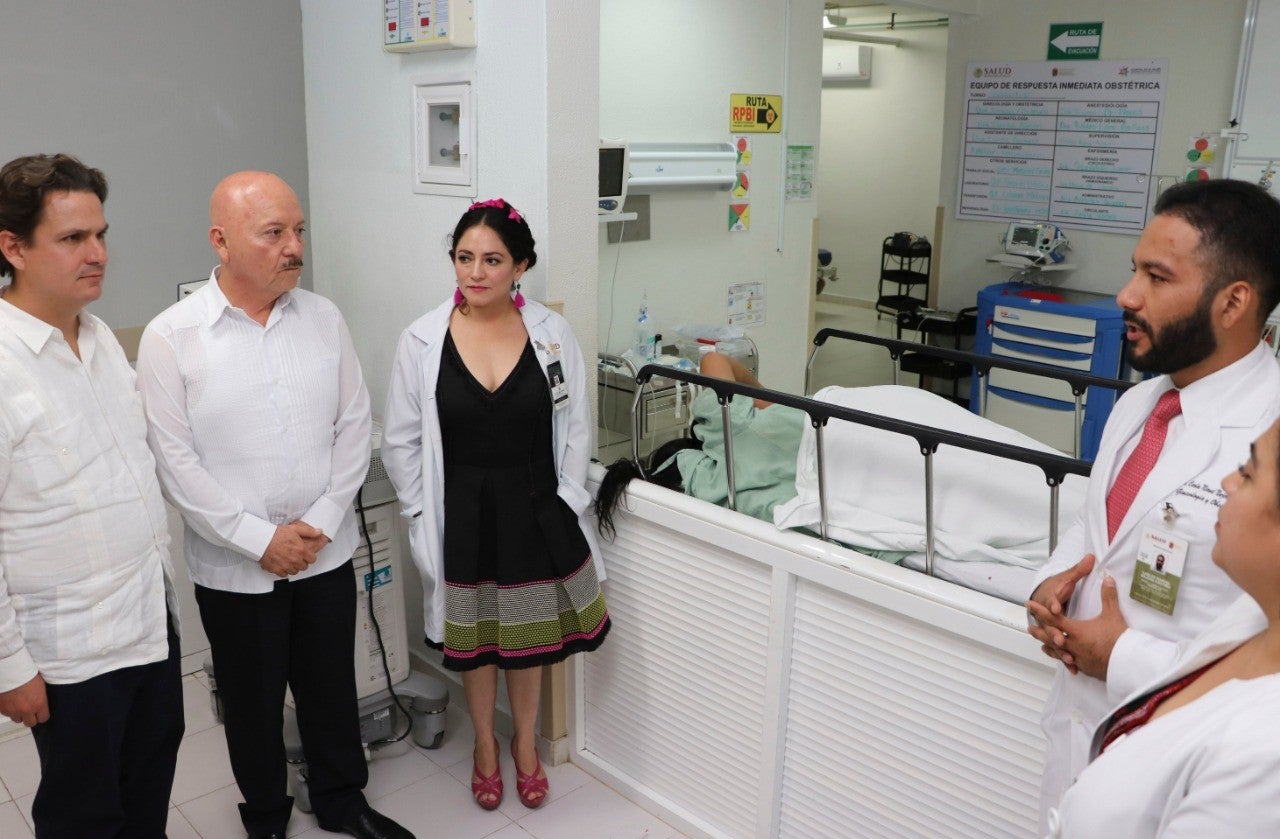
Originally published in Spanish by Chiapas Secretary of Health
San Cristóbal de Las Casas, Chiapas.-
The State Government, through the Ministry of Health, recognized the Inter-American Development Bank (IDB) as a partner for promoting projects that strengthen timely care of obstetric and neonatal complications, which contribute to the reduction of maternal and infant mortality in the most vulnerable communities of the 18 municipalities of Sanitary Jurisdiction number II of San Cristóbal de Las Casas.
Within the framework of the IDB's 60th anniversary activities, the municipality of San Cristóbal de Las Casas was selected so that the members and directors of this organization, made up of 48 countries, could witness firsthand the successful experiences that the Ministry of Health of Chiapas has carried out to benefit the most vulnerable population.
Representing the state governor, Rutilio Escandón Cadenas, the Secretary of Health, José Manuel Cruz Castellanos, accompanied by the Executive Director for Mexico and the Dominican Republic, Juan Bosco Martí Ascencio; the IDB representative in Mexico, Tomás Bermúdez, and the IDB Health Specialist, Ana Mylena Aguilar, witnessed the successful strategies within the framework of the Salud Mesoamérica Initiative.
The head of the state agency mentioned that Health Jurisdiction number II benefits 18 municipalities in the Altos Tsotsil-Tseltal Region, where, together with the IDB's Salud Mesoamérica Initiative, the Línea de Vida program was implemented to care for women, pregnant women, postpartum women, newborns and children under five years of age, through health centers, maternity homes and the Community Social Network; as well as the Mater or Red Code project to attend obstetric emergencies and the improvement in adequate and dignified treatment in the Women's Hospital of San Cristóbal de Las Casas.
Cruz Castellanos stressed that successful experiences are a strong proof of working in synergy with organizations such as the Inter-American Development Bank, with great advances in health to meet development indicators, so she thanked the investment and unconditional support they have put in Chiapas, as they have achieved great progress in reducing maternal death.
In turn, the executive director for Mexico and the Dominican Republic, Juan Bosco Marti Ascencio, emphasized that it is a great satisfaction to hear these life stories of mothers who managed to save their lives and those of their children, making it one of the best gifts on the anniversary of the IDB to know that it has helped so many women and children, and that thanks to the progress that Chiapas has achieved, it will continue to have the financial support of this organization.
While the IDB representative in Mexico, Tomás Bermúdez, stressed that these successful experiences are a reflection of the joint work of local and state health authorities, the community and the technical and financial support of the IDB, with which can achieve common objectives.
The first success story is that of Rufina, the midwife of the Maternity Home in Romerillo, municipality of San Juan Chamula, who presented her experience with two pregnant women. She said that both of them did not know how long they had been pregnant, so, as a midwife trained by health personnel, she immediately referred them to the Maternity Home of San Cristóbal de Las Casas so that they could have an ultrasound performed, diagnosing pregnancy in term and they were able to have their childbirth attended, thus avoiding maternal and infant death.
The second story is about Irene, who is the leader of the Community Social Network of the municipality of Aldama, who thanks to her convening power has managed to integrate more women, to whom she trains on the benefits of using a permanent or temporary method of family planning, and explains that the fewer children they have the better quality of life, that it is not good to have a child every year because it affects their health, and also invites men to participate in this activity.
The third story is about Linda Santiago, a native of San Cristóbal de Las Casas, who was diagnosed with eclampsia at 32 weeks of gestation. She went to the Women's Hospital in the municipality, where she was immediately admitted and activated the Mater or Red Code, which is a protocol for obstetric emergencies, with a comprehensive medical team that treated her in a timely manner and managed to save her life and that of her son.
Present at this event were Octavio Coutiño Niño, head of Sanitary Jurisdiction II; Sofia Carlota Aguilar Herrera, director of the Women's Hospital; Arturo Mariscal Ochoa, deputy director of Medical Care; and Emilio Ramírez Guzmán, secretary for the Sustainable Development of Indigenous Peoples. For the IDB, the executive directors for Belize, Costa Rica, El Salvador, Guatemala, Honduras and Nicaragua, Edna Gabriela Camacho; for Panama and Venezuela, Gina Montiel; and for Germany, Belgium, China, Israel, Italy, the Netherlands and Switzerland, Christiane Bogemann-Hagedorn.
The executive directors for Colombia and Peru, Gerardo Mario Corrochano Villalobos; for Bolivia, Paraguay and Uruguay, Germán Rojas Irigoyen; for Chile and Ecuador, Alejandro Foxley; for Argentina and Haiti, Federico Ignacio Poli; for the United States, Eliot Pedrosa; for Canada, Donald John Bobiash; and for Bahamas, Barbados, Guyana, Jamaica and Trinidad and Tobago, Selwin Charles Hart; as well as advisors, specialists and advisors.